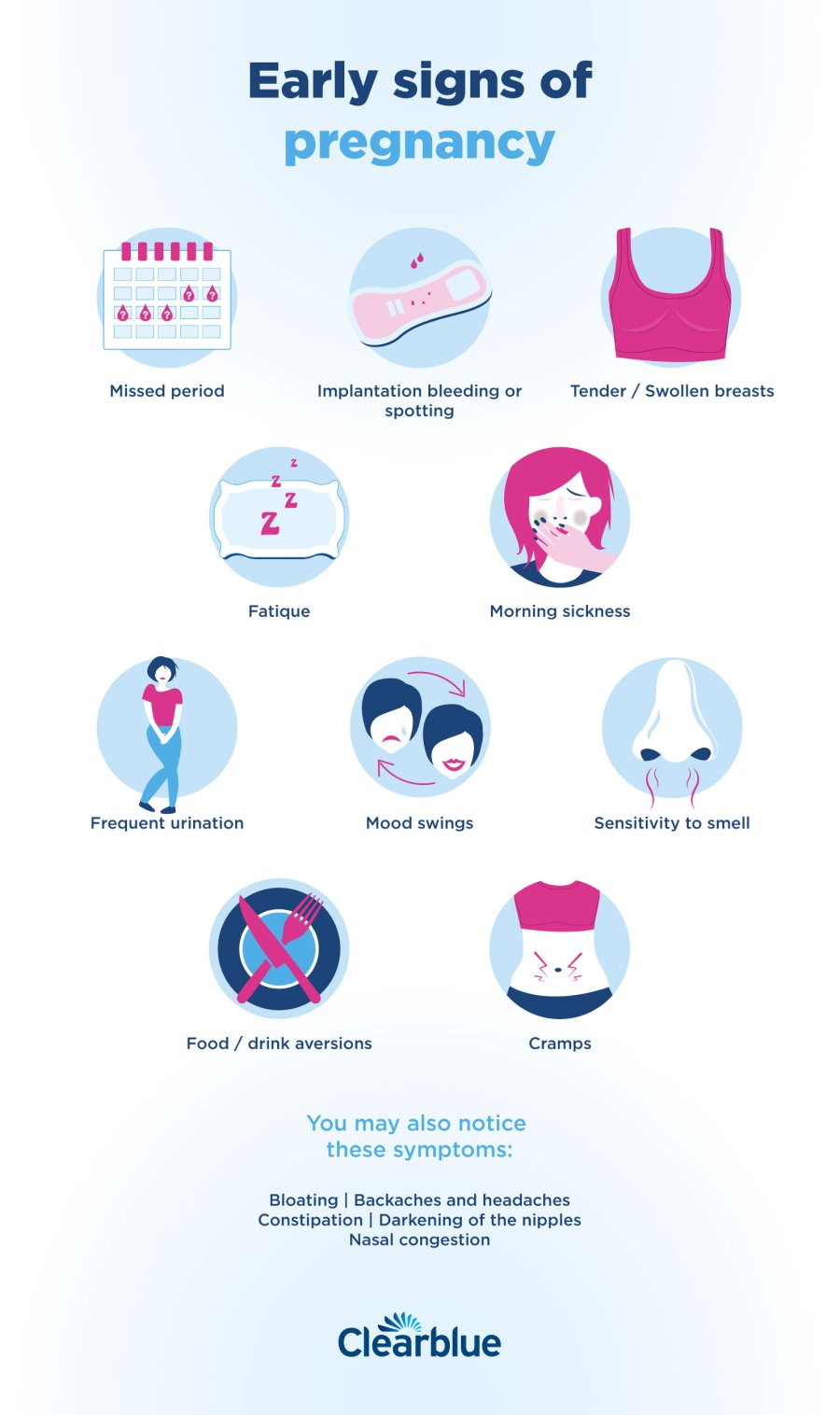
The First Signs of Pregnancy: A Comprehensive Guide
Pregnancy is a transformative journey that begins with a series of subtle yet significant changes in the body. Recognizing the early signs of pregnancy can be crucial for expectant mothers to seek timely prenatal care and ensure the well-being of both themselves and their developing baby. This comprehensive guide explores the most common first signs of pregnancy, providing an in-depth understanding of their causes, timing, and implications.
1. Missed Period
One of the most telltale signs of pregnancy is a missed period. Typically, a woman’s menstrual cycle lasts between 21 and 35 days, with ovulation occurring around day 14. If a woman misses her expected period, it could indicate that she has conceived. However, it is important to note that missed periods can also be caused by other factors, such as stress, hormonal imbalances, or certain medications.
2. Implantation Bleeding
Implantation bleeding occurs when the fertilized egg attaches to the lining of the uterus, usually 6-12 days after ovulation. This bleeding is typically light and may appear as a few drops of blood or a light pink discharge. It can last for a few hours or up to a few days. Implantation bleeding is not always present, and its absence does not necessarily mean that pregnancy has not occurred.
3. Breast Tenderness
Breast tenderness is a common early sign of pregnancy, often beginning around the time of implantation. The breasts may become swollen, sensitive to touch, and slightly lumpy. This is due to hormonal changes that prepare the breasts for milk production.
4. Nausea and Vomiting
Nausea and vomiting, commonly known as morning sickness, affect up to 80% of pregnant women. It typically begins around week 6 of pregnancy and can last throughout the first trimester. The exact cause of morning sickness is unknown, but it is thought to be related to hormonal changes and increased sensitivity to certain smells and tastes.
5. Fatigue
Extreme fatigue is a hallmark of early pregnancy. The body undergoes significant hormonal and physiological changes, which can lead to feelings of exhaustion. Progesterone, a hormone that supports pregnancy, can also contribute to fatigue.
6. Frequent Urination
Frequent urination is another common early sign of pregnancy. As the uterus grows, it puts pressure on the bladder, leading to an increased urge to urinate. This symptom typically becomes more pronounced as the pregnancy progresses.
7. Food Cravings and Aversions
Changes in taste and smell are common during pregnancy. Some women experience intense cravings for certain foods, while others develop aversions to foods they previously enjoyed. These changes are thought to be related to hormonal fluctuations and increased sensitivity to certain scents.
8. Mood Swings
Mood swings are a common side effect of pregnancy, particularly in the first trimester. Hormonal changes can lead to feelings of irritability, anxiety, or depression. These mood swings can be unpredictable and may vary in intensity.
9. Bloating
Bloating is a common symptom of early pregnancy, often occurring alongside constipation. This is due to hormonal changes that slow down digestion and relax the muscles in the digestive tract.
10. Basal Body Temperature Elevation
Basal body temperature (BBT) is the lowest body temperature recorded during sleep. After ovulation, BBT typically rises by about 0.5-1 degree Fahrenheit. If the BBT remains elevated for more than 18 days, it could be a sign of pregnancy.
When to Seek Medical Attention
While most early pregnancy signs are normal, it is important to seek medical attention if you experience any of the following:
- Severe abdominal pain or cramping
- Vaginal bleeding that is heavy or persistent
- Fever or chills
- Nausea or vomiting that is severe or persistent
- Blurred vision or severe headaches
These symptoms could indicate a potential complication, such as an ectopic pregnancy or a miscarriage. Early diagnosis and treatment are crucial for the well-being of both the mother and the developing baby.
Conclusion
Recognizing the first signs of pregnancy can be an exciting and empowering experience. By understanding the common symptoms and their timing, expectant mothers can make informed decisions about their prenatal care and prepare for the transformative journey ahead. Remember, every pregnancy is unique, and the intensity and timing of symptoms can vary from woman to woman. If you suspect you may be pregnant, it is always advisable to consult with a healthcare professional for confirmation and guidance.